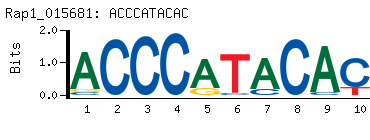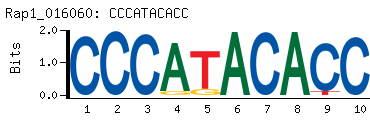|
|
| -Genomic Data for Rap1 |
Links |
- Protein
|
- UniPROBE Accession Number
- UP00398
|
- Species
- Saccharomyces cerevisiae
|
- Domain
- Myb
|
- Swiss-Prot
- P11938
|
- Name and Synonyms
- Name: None Available.
Synonyms:"DNA-binding protein RAP1, GRF1, N1310, Repressor/activator site-binding protein, SBF-E, TBA1, TUF, TUF1, YNL216W"
|
- IHOP
- 35577
|
- NCBI RefSeq
- NP_014183
|
- Description
- "DNA-binding protein involved in either activation or repression of transcription, depending on binding site context; also binds telomere sequences and plays a role in telomeric position effect (sil..."
|
- JASPAR
-
None Available
|
| -PBM Motif Data for Rap1 |
- PBM-Derived DNA Binding Site Motif
(Seed-And-Wobble)
-

|
- PWM
-
Save
|
- Top Kmer
-
CCC..ACACC E.S. 0.497
GGTGT..GGG E.S. 0.497
|
- PBM-Derived DNA Binding Site Motif
(BEEML-PBM) (AMADID # 015681)
-

|
- PWM
-
Save
|
- Consensus
-
ACCCATACAC
GTGTATGGGT
|
- PBM-Derived DNA Binding Site Motif
(BEEML-PBM) (AMADID # 016060)
-

|
- PWM
-
Save
|
- Consensus
-
CCCATACACC
GGTGTATGGG
|
- Downloads
-
Download the
zip
of all Rap1 PBM files
or view the downloads directory for individual files.
Please note that the files which include probe sequence data are protected by an academic research use license,
which can be viewed here.
|
- Link to TFBSshape
-
This link will take you to the corresponding entry for Rap1
in TFBSshape,
a database which provides information about the shape of the DNA at transcription factor binding sites.
http://rohslab.cmb.usc.edu/TFBSshape/?tfid=&geneID=398&sourceDB=uniprobe
|
| -Rap1 Datasets |
| Gene |
Clone Type |
Last Modified |
Save |
View |
|
Rap1 |
Full length clone |
2014-07-16 |

|

|
- Rap1 Insert Sequence
-
1 MSSPDDFETA PAEYVDALDP SMVVVDSGSA AVTAPSDSAA EVKANQNEEN
51 TGATAAETSE KVDQTEVEKK DDDDTTEVGV TTTTPSIADT AATANIASTS
101 GASVTEPTTD DTAADEKKEQ VSGPPLSNMK FYLNRDADAH DSLNDIDQLA
151 RLIRANGGEV LDSKPRESKE NVFIVSPYNH TNLPTVTPTY IKACCQSNSL
201 LNMENYLVPY DNFREVVDSR LQEESHSNGV DNSNSNSDNK DSIRPKTEII
251 STNTNGATED STSEKVMVDA EQQARLQEQA QLLRQHVSST ASITSGGHND
301 LVQIEQPQKD TSNNNNSNVN DEDNDLLTQD NNPQTADEGN ASFQAQRSMI
351 SRGALPSHNK ASFTDEEDEF ILDVVRKNPT RRTTHTLYDE ISHYVPNHTG
401 NSIRHRFRVY LSKRLEYVYE VDKFGKLVRD DDGNLIKTKV LPPSIKRKFS
451 ADEDYTLAIA VKKQFYRDLF QIDPDTGRSL ITDEDTPTAI ARRNMTMDPN
501 HVPGSEPNFA AYRTQSRRGP IAREFFKHFA EEHAAHTENA WRDRFRKFLL
551 AYGIDDYISY YEAEKAQNRE PEPMKNLTNR PKRPGVPTPG NYNSAAKRAR
601 NYSSQRNVQP TANAASANAA AAAAAAASNS YAIPENELLD EDTMNFISSL
651 KNDLSNISNS LPFEYPHEIA EAIRSDFSNE DIYDNIDPDT ISFPPKIATT
701 DLFLPLFFHF GSTRQFMDKL HEVISGDYEP SQAEKLVQDL CDETGIRKNF
751 STSILTCLSG DLMVFPRYFL NMFKDNVNPP PNVPGIWTHD DDESLKSNDQ
801 EQIRKLVKKH GTGRMEMRKR FFEKDLL
|
- References
-
Data are analyzed by array design with AMADID # in Berger et al., Nat Biotech 2006
|
|